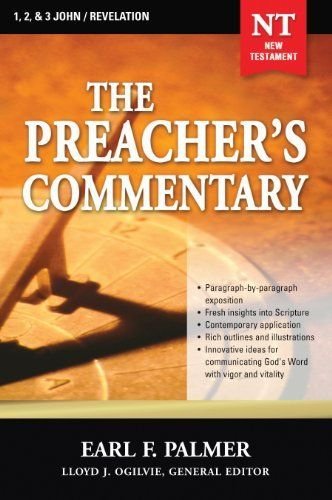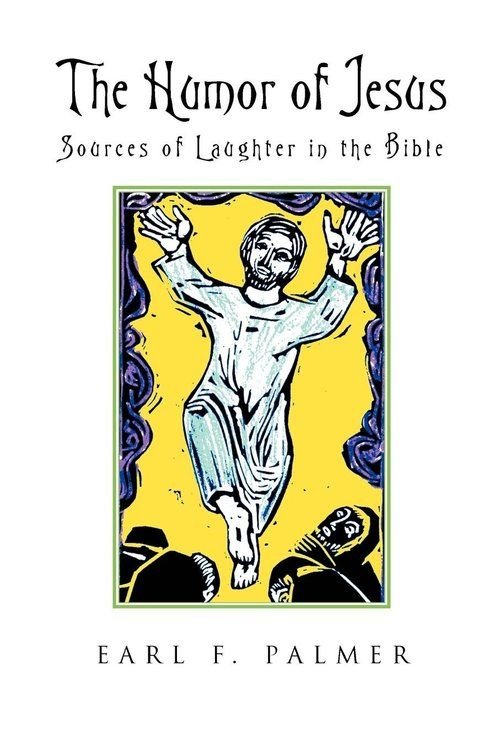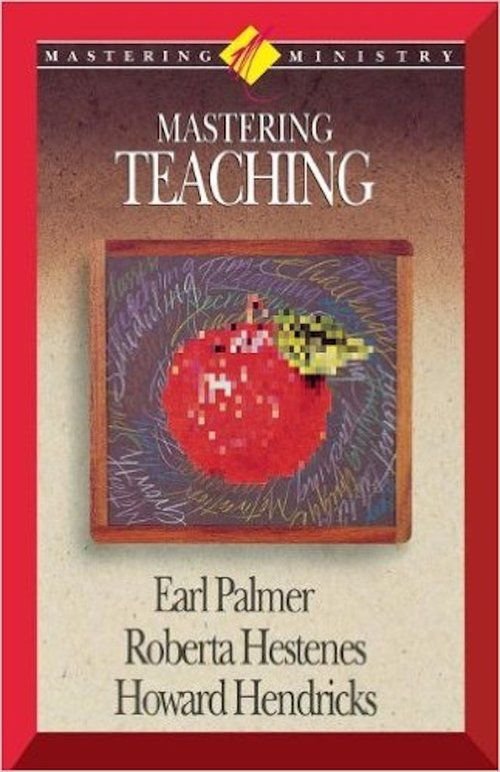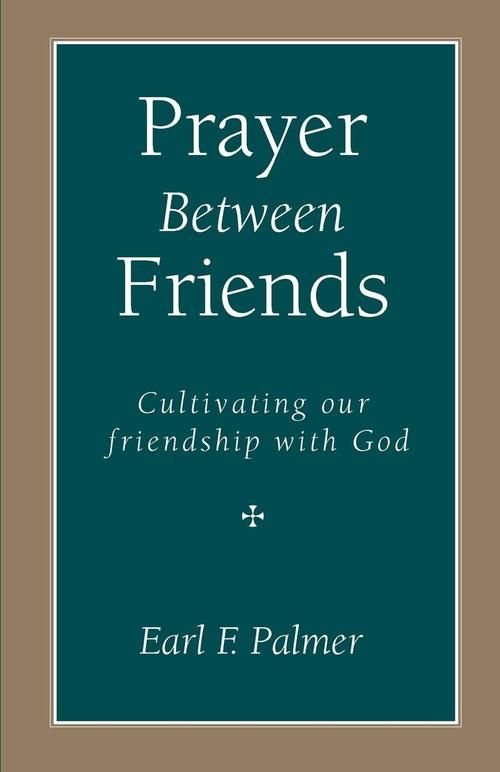
Books
Laughter in Heaven
A Commentary on the Book of Romans
The parables of Jesus are of untiring interest because they have the intriguing capacity to dole out their meaning here a little, there a little, new new insights revealed by changing times. Here, master Bible expositor Earl Palmer finds in them the truths awaiting our generation, and presents those truths with a gifted sense of illustration and application. Partly because their veiled nature, the parables never grow old. Far from what we sometimes hear, they are not little stories so simple that they can make truth transparent, so anyone can understand. Jesus used parables so that the truth will actually be hidden from those who had rather not see it in the first place (Matthew 13:11-15). But for those who long for the truth, it is there for the discovering. (1987)
Called to be a People of the Gospel
St. Paul’s New Testament Letter to the Ephesians
In this expositional commentary of the Letter to the Ephesians, Paul shares that the universal goodness of the gospel--the news of grace and truth from Jesus Christ--is not just for Jews but is for all people, regardless of birth, tribe, or nationality. And, in his letter to the first-century church at Ephesus, Paul gives realistic and practical guidance for how to live as one people of the gospel in words that are as relevant today as they were in the first century.
Salvation by Surprise
A Commentary on the Book of Romans
In this provocative and informative Bible study, Earl Palmer brings fresh insights into the life and times of the Apostle Paul. Each of the sixteen chapters of Romans is divided into smaller units for thoughtful consideration. Designed for personal and small-group study, Salvation by Surprise enables the reader to look behind the scenes and catch a glimmer of the intent, purpose and excitement of the Book of Romans. Paul is seen as the prosecutor of humanity, offering history’s first genuine, whole view of human existence, The prosecutor then movies across the courtroom and offers a defense, a strong word of hope. And finally, speaking to all Christians who would grow, Paul’s words become pastoral and supportively personal. Drawing upon his rich experience as a pastor, Earl Palmer provided insights into the Book of Romans that are both spiritually warm and practically relevant. This is an enriching study for any student of the bible – lay or clergy. (1975)
The Preacher's Commentary
A Commentary on the Book of Revelation
The Preacher's Commentary offers pastors, teachers, and Bible study leaders clear and compelling insights into the Bible that will equip them to understand, apply, and teach the truth in God's Word. Each volume is written by one of today's top scholars and includes: Innovative ideas for preaching and teaching. Vibrant paragraph-by-paragraph exposition. Impelling real-life illustrations, Insightful and relevant contemporary application,
An introduction, which reveals the author's approach, A full outline of the biblical book being covered, Scripture passages (using the New King James Version) and explanations
Combining fresh insights with readable exposition and relatable examples, The Preacher's Commentary will help you minister to others and see their lives transformed through the power of God's Word. Whether preacher, teacher, or Bible study leader--if you're a communicator, The Preacher's Commentary will help you share God's Word more effectively with others.
To Run the Race
Paul’s Second Letter to Timothy
“This final letter of St. Paul is a very special book for me. Everything about II Timothy is interesting: The people we meet in its pages, the historic events of its time of writing, and best of all, the message Paul shares. It was written after the mid-point of the first century, during the harsh persecution of Christians during and following the fire at Rome in 64 CE (AD). Nero is emperor, but Paul dares to write about his faith. Paul’s trust in Jesus Christ is shared not only with the young friend named Timothy, who receives this letter, but also with all who have read this letter since then. Paul does not talk down to the young man, but writes like a coach to a teammate. He encourages Timothy trust in the durability and contagious relevance of the good news of the gospel to change people’s lives, even those caught up in sin or danger. This is a letter of amazing grace for everyone, as men and women, you and old who are modeling the journey of our own lives. We need Paul’s wisdom just as much as a first-century reader named Timothy, who first opened its pages.”
– Earl F. Palmer (2014)
Trusting God
A Christian Faith in a World of Uncertainty
Can we really know that Christianity is true? Is there a place for doubt in the Christian life? Pastor Earl Palmer tackles these and other crucial questions in this helpful book, showing that authentic Christian faith is not a blind leap into the dark, but rather personal trust in the God who reveals himself in the Bible. Faith is putting our weight upon the faithfulness of God. It is our response to the evidence of God’s self-evidence. Through numerous biblical examples Earl Palmer shows the many ways that we can be assured that our faith is well placed and yet be open to honest inquiry and deep self-questioning. Anyone who has ever been paralyzed in their faith by the forces of internal doubt will benefit from prayerfully reading this book. (2006)
The Humor of Jesus
Sources of Laughter in the Bible
There are many kinds of laughter. Some forms can be used to deride and ridicule, other forms can be used to lift up and encourage. What does this have to do with the Bible? Plenty, according to Earl Palmer, who suggest in this unique book that Jesus Christ is the greatest humorist of all time. In this book Palmer explores the reasons why people laugh, how Christ not only used techniques such as exaggeration, irony, and “the unexpected” to convey his message, carefully distinguishing how this is different from the humor of confusion, chaos and meaninglessness . “We need to laugh,” writes Palmer, “because life is exciting and the source of happiness is as joyous as it is serious. The laugher from good humor makes it possible for the person with resentments to disarm and realistically reassess some of the most bitter edges of those resentments.” (2001)
The Book That John Wrote
Studies in John
The Gospel of John is the intimate Gospel, says Earl Palmer, because it is the most personal and revealing of all the portraits of Jesus in the New Testament. It is “an intimate journal” of a man who knew Jesus personally, who can tell us not only what Jesus did, but also what he thought and felt. It is the intimate Gospel, as well, because John’s aim is to produce in the reader the same faith and trust Jesus called forth in his lifetime. In this stimulating study, Earl Palmer takes us on a fascinating journey through this most personal of narratives, seeking to interpret its historical and theological significance but also to confront the really vital and costly questions it raises for the believer: What does John’s narrative about Jesus mean for my life here and now? Included is a study guide to facilitate both individual reading and group discussion. (1999)
Mastering Teaching
Mastering Teaching Series
The Mastering Ministry Series covers the various challenges of a ministry encounters and teaches how to deal with them-one subject at a time. Mastering Ministry is a perfect “survival guide” for today’s pastor addressing relevant topics such as worship, preaching, controversies, evangelism, church management, pastoral care, fundraising and personal growth. This series brings together some of the best minds on specific areas of pastoral ministry and presents their insights in a readable, personal way. Each book is coauthored by three church leaders recognized for their experience and expertise. (1991)
Prayer Between Friends
Cultivating Our Friendship with God
“Prayer is our side of the friendship we experience in our relationship with Almighty God.”
In Prayer Between Friends, Earl Palmer guides you into a deep abiding relationship with God. He digs into the Bible to offer insights into the personality, practices, and purposes of prayer. Drawing up on the examples set by our Lord Jesus Christ, David and Job, among the biblical personalities, the author teaches important lessons, including:
Establishing our faith on the reality of God’s presence rather than our feelings,
Clinging to God’s promise in the midst of confusion or suffering,
Trusting God enough to be honest with him,
Recognizing the privileges of praying is Jesus’ name,
Relying on God for daily sustenance,
Confessing our sins and receiving forgiveness,
Tackling temptation
Praying with other believers.
(1991)
The Book that James Wrote
Commentary on the Book of James
Just as the book of Proverbs in the Old Testament served as a book of advice to the Jewish people, so James, according to Earl F. Palmer, is a New Testament book of advice to Christians. And it contains a great wealth of instruction and admonition as relevant to Christians today as it was to its first-century audience. In The Book that James Wrote , Palmer offers a user-friendly guide to James that is ideal for pastors and parishioners, for personal or small-group study. In the opening chapters, Palmer interestingly sets the historical scene behind the book of James, discussing the cook’s authorship, date and the political and religious atmosphere of the city of Jerusalem and its first church. He also examines the book of James itself, its structure, its major themes, and it its remarkable similarity to the book of Proverbs. In the main body of the book Palmer first provides a verse-by-verse commentary on James before focusing more deeply on the such pastoral-theological themes as the nature of God and the meaning of faith, wisdom, temptation, hope and patience. (1997)
Integrity in a World of Pretense
Insights from the Book of Philippians
Hype and appearance. That is the type of generation we live in, says much-respected writer Earl Palmer. Integrity has taken a beating in this modern world of ours, as we know from watching the nightly news. Even the religious world has had its share of scandals. Somehow our Christian senses have been deadened by all the glitz and noise. And somehow it has made our quest to live a life consistent with the gospel more and more difficult. And Earl Palmer believes that Paul, in the book of Philippians, has much to say to our generation about integrity in life. One of its steady themes is the concern that Paul and his friends have for living their daily lives “worthy of the gospel.” It is a message for us today as well. Palmer, with his gift for expository teaching, unfolds the insights of this short letter and offers them to us as a guide to the kind of life, full of integrity and depth, we all want to live for Christ. (1992)
Sign Posts
Living With Christian Values in
an Age of Uncertainty
Without signposts, even the most astute traveler can run adrift. One misstep…one wrong turn…one missed road marker…and suddenly there is the cold realization of being lost. Our spiritual lives also need signposts – values that not only steer us in the right direction but also help us avoid the jarring potholes along the way. In this book, Earl Palmer examines ten of these essential values that work well in daily path finding and hold true through a lifetime. In a series of probing and provocative chapters, Palmer explores wisdom, trusting God, love, balance, family, peace, life, promises, value or worth, and the future. By using the Bible as a touchstone, Palmer charts a course through the passages that deepen our faith and test the validity of our present values. (1990)
The 24-Hour Christian
Sheer Encouragement for the Christian in the World
Of course we want to be full-time Christians. But that’s tough to do. Wouldn’t it be easier if someone came alongside to help us and encourage us? That’s just what Earl Palmer does in this book. He walks with us, shares the joys and struggles of his own journey, and passes along wisdom that comes from his intimate experience with God in Jesus Christ. Getting along with our parents, using money well, bringing God into all our relationships; these topics are all covered. But overall Palmer urges us to stay close to Jesus. For he has what we need to pursue this serious and joyful call. Jesus provides his Spirit to be with us 24 hours a day. (1987)
The Enormous Exception
Meeting Christ in the Sermon on the Mount
The prayer for forgiveness asks for total help, and because the power of that help is so profoundly far-reaching, it is understandable how this request should break out from the forgiveness we have received and be expressed by us toward those around us. We cannot have one without the other because the power of forgiveness is so great. This personal experience is so completely life changing that it radically alters everything – my self-view, my understanding of other people my, ethics, my emotions. Because of God’s forgiveness there must be a celebration, as in the story Jesus told of the return of the prodigal. the joy that is created by forgiveness is too radically and totally good to keep as a secret. Forgiveness creates the celebration because of its surprise. Just when we were convinced of our helpless entrapment and downward slide into condemnation and despair we are confronted instead by acceptance and the love that knows how to cope with failures and how to heal the memories of failure. Because of this good surprise in the good news we are invited to the grand party of the Father. “This my son was dead but now alive.” (1986)
Old Law, New Life
Weathering the Storms of Doubt
The law of the Old Testament is often seen as an inhibitor to full human potential. Noted Author Earl F. Palmer, however, believes that the law enhances life. In this thoughtful volume, he offers a fresh view of the ancient code of Moses and presents positive, practical application of the Ten Commandment for today. Based on solid scholarship, this book examines the meaning of the law in its Jewish context and Exodus 20 and Deuteronomy 5 within the contexts of both the Old Testament and the Bible as a whole. This book integrates the Old Testament journey with that of today’s Christian faith and demonstrates how the Ten Commandments document the promise of their author – the promise that is revealed in Jesus Christ. Ideal for all persons seeking new insights into the Bible and social issues, it ends with a helpful bibliography and series of study questions designed for group or personal use. (1984)
I And II Thessalonians
A Good News Commentary
This illuminating and groundbreaking study brings alive the world of the first-century church and gives exciting new insights on Paul’s letters, which deal with problems and issues that confront Christians today. More importantly, Earl Palmer shows to just what depth these epistles express the electrifying and invigorating faith of Paul. He examines the apostle’s writings as teaching letters from a pastor to his congregation; personal letters from a friend to friends; and documents within the whole witness of the Bible – critical to God’s unfolding revelation throughout the the Old and New Testaments. This letters – “warm and human, clearheaded and salty” – draw us into an immediate experience of that wellspring of faith manifested in Paul. Palmer’s discussion clarifies specific textual and theological issues casts new light on central themes, including the meaning of discipleship, and the need for continued renewal with the Christian church and invites us to share, with Paul, the reality of Jesus Christ – at once the living center of these documents, the heart of the whole Bible, and the source of its authority. (1983)
Alive From The Center
The Ten Commandments and New Testament Faith
This book introduces you to a most original parable, a true model for the centered life. This parable is based on the ordinary bicycle wheel, with its hub and spokes, tires and rim. Like the bicycle wheel, the balanced life must revolve around a true hub. Only Christ can serve as the hub in our lives. Anything else we try to put in the center, no matter how worthy, is sure to throw us off balance. The spokes of the wheel which radiate in all directions from the hub, are the various personal traits, talents, gifts and discoveries that make each of us unique, different from one another, yet serving the same purpose of letting strength and support flow outward from the center. The rim of the wheel, which unites the spokes at the circumference, represents our spiritual life together: our family, friends, and church. And the tire, which cushions us from bumps and carries us along the road, is a symbol of our outreach, mission and contact with the world. (1982)
I And II Thessalonians
A Good News Commentary
This illuminating and groundbreaking study brings alive the world of the first-century church and gives exciting new insights on Paul’s letters, which deal with problems and issues that confront Christians today. More importantly, Earl Palmer shows to just what depth these epistles express the electrifying and invigorating faith of Paul. He examines the apostle’s writings as teaching letters from a pastor to his congregation; personal letters from a friend to friends; and documents within the whole witness of the Bible – critical to God’s unfolding revelation throughout the the Old and New Testaments. This letters – “warm and human, clearheaded and salty” – draw us into an immediate experience of that wellspring of faith manifested in Paul. Palmer’s discussion clarifies specific textual and theological issues casts new light on central themes, including the meaning of discipleship, and the need for continued renewal with the Christian church and invites us to share, with Paul, the reality of Jesus Christ – at once the living center of these documents, the heart of the whole Bible, and the source of its authority. (1983)
The Intimate Gospel
Studies in John (Republished as “The Book that John Wrote”)
The Gospel of John is the intimate Gospel, says Earl Palmer, because it is the most personal and revealing of all the portraits of Jesus in the New Testament. It is “an intimate journal” of a man who knew Jesus personally, who can tell us not only what Jesus did, but also what he thought and felt. It is the intimate Gospel, as well, because John’s aim is to produce in the reader the same faith and trust Jesus called forth in his lifetime. In this stimulating study, Earl Palmer takes us on a fascinating journey through this most personal of narratives, seeking to intepret its historical and theological significance but also to confront the really vital and costly questions it raises for the believer: What does John’s narrative about Jesus mean for my life here and now? Included is a study guide to facilitate both individual reading and group discussion. (1978)
Love Has Its Reasons
An Inquiry into New Testament Love
While not primarily a biblical word study, this book draws on the biblical text. It also puts the New Testament concept of love as a decision-event into its first century setting, so that we get an idea of how the Greeks and Romans of the first-century Mediterranean world would have understood New Testament love when its liberating newness first broke upon them. The exciting this is, says Mr. Palmer, that God’s decision to love still stands in our time with the same healing, fulfilling authority it had when he put his love in action in Jesus Christ. Earl Palmer has the rare gift of making the Bible come alive, of making first-century concepts, as up-to-date and understandable as today’s newspaper. More important, he demonstrates their life changing nature. (1977)




















